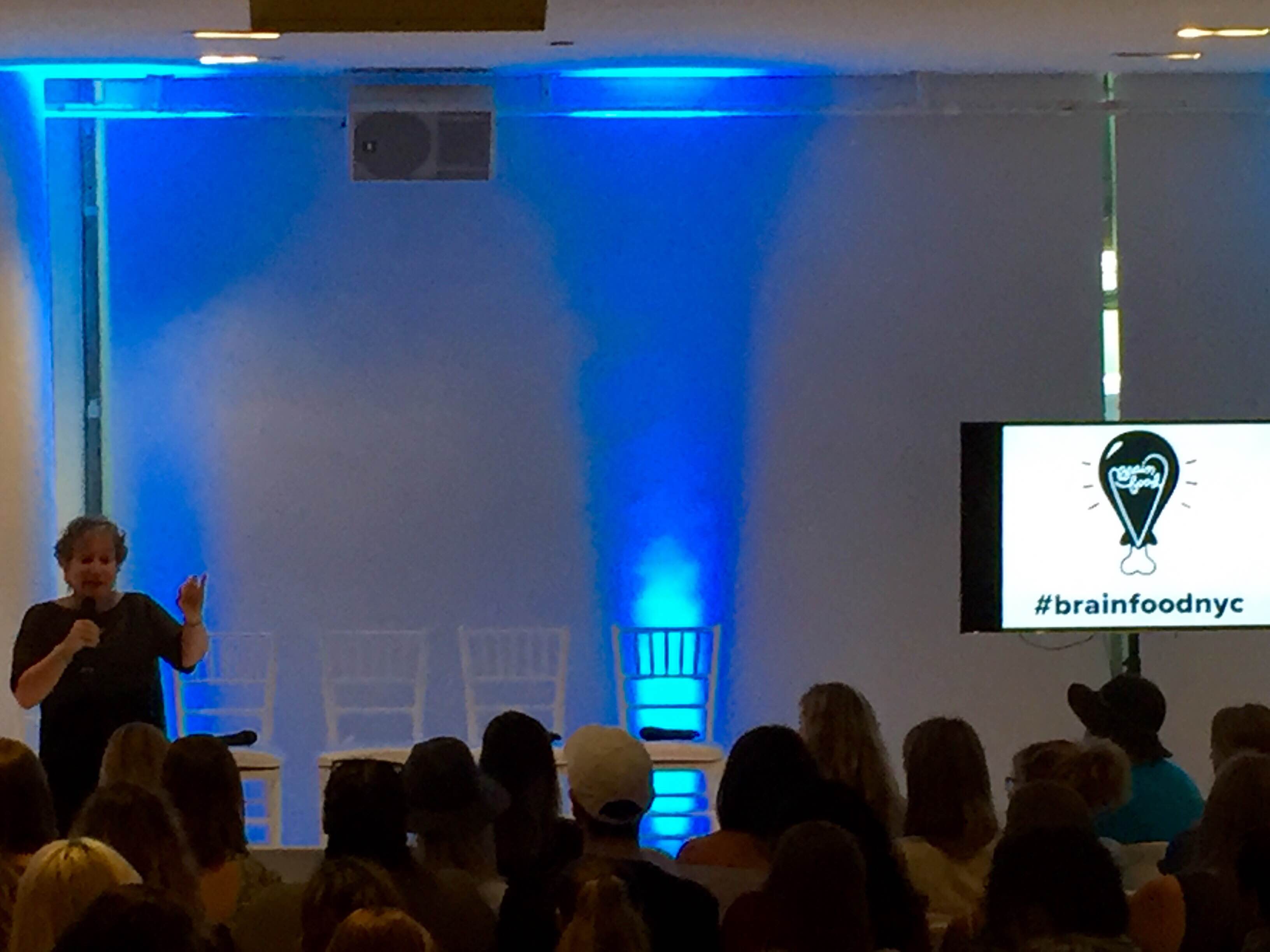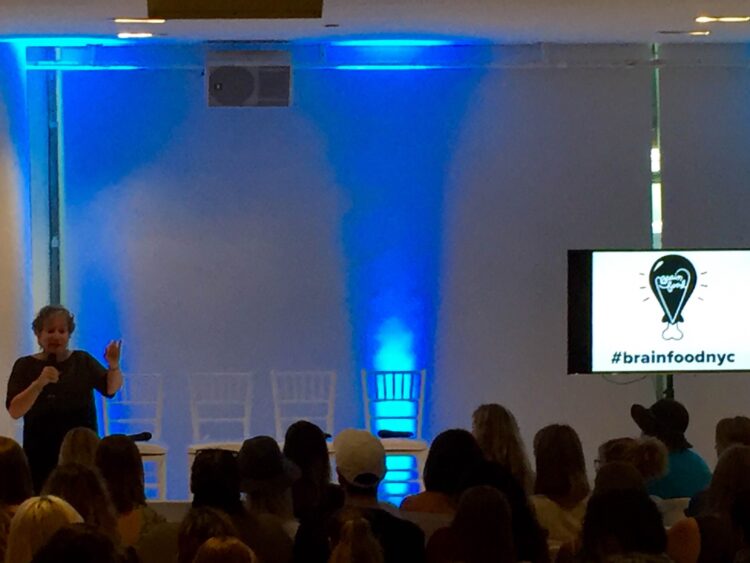
When you look through your Facebook feed, you might see videos that demonstrate how to make funfetti Kit Kats or pretzel Nutella fudge. Even if you’re not hungry, it’s hard to scroll past these scrumptious-looking tutorials, which come from online food media platform, Spoon University.
Mackenzie Barth and Sarah Adler founded Spoon University, a site filled with written content and videos in 2010. For the past three years, the company has been hosting an annual event titled “Brainfood,” which features prominent speakers from the food industry. Brainfood 2016 took place recently.
This year’s conference discussed success in the food industry, social media marketing, food sourcing, and defining “healthy” food, among other topics. Noteworthy food entrepreneurs educated the audience while they ate catered gourmet food from local hotspots.
The event began with a talk from Lisa Mann, CEO of Think Marketing Advisors. Mann, who spent 28 years in food marketing with companies like Nabisco and Kind, stressed the importance of staying true to your company’s brand image when developing marketing strategies. In order for brands to maintain this consistency, Mann said companies must do the following to achieve success: know the consumer, protect the brand, and understand the “consumer zeitgeist,”—or the general spirit of the current generation.
After Mann’s talk, the audience was in a food coma from the free donuts, oatmeal and coffee they consumed. It was time for a lighthearted panel about food and social media. Speakers included Paul Kim and Ken Lo, cofounders of NYC ice cream joint Ice & Vice, Mike Chau, founder of Instagram account @Foodbabyny, and Steve Klein, co-owner of Dough donuts.
Kim said that social media is necessary for people to discover his shop. Since Ice & Vice is located in “the middle of nowhere,” Kim said he must construct visually appealing images of his product so consumers will make the trek.
“We just treat it as another component in the things that we create,” he said.
The panel also discussed the significance of food bloggers today. They said it is important for bloggers to tag the restaurant in their post so followers know where to get the food and so restaurant will gain the business. While bloggers and others use Instagram to decide what to eat, restaurant-owners use it for menu inspiration.
Mike Chau, who became accidentally famous by posting pictures of his food on Instagram, doesn’t typically earn money from his posts, but said he has had people reach out to him for business inquiries.
His advice to aspiring food bloggers? They should only accept a brand endorsement if it provides an intrinsic benefit along with the financial benefit. Chau also recommends people to post pictures of what they like and then worry about the hashtags, rather than post a photo because it fits an Instagram cliché, like the monstrous milkshakes that seem to appear on every food account.
At the end of the talk, panelists unanimously agreed that despite the emphasis we place on curating perfect food pictures, the food itself is still more important than the post.
“No matter how beautiful your food looks on Instagram, there is never a substitute for delicious food,” Klein said.
The next talk featured advice from Josh Hix, the CEO of Plated, Matt Doumar, cofounder of Good Uncle, and Katrina Markoff, creator of Wild Ophelia.
Hix founded Plated after seeing need in the food market to reduce waste and cut costs. He discovered that grocery stores waste 35 percent of food, and created a business model to deliver fresh ingredients and corresponding recipes to consumers while conserving excess food.
Plated only wastes 3 percent of its food, which it donates to local food banks. Hix says his passion to reduce waste has created a successful business. His advice for young entrepreneurs is to prioritize passion over greed.
“Focus on something you love,” he said.
Good Uncle is another delivery-based company, which Doumar created to give remote cities access to food from prominent NYC restaurants.
“A lot of these consumers may not know brands, but we believe that food is the new rock and roll,” he said.
Markoff, who went to culinary school in Paris and worked for prominent chefs in Spain, founded Wild Ophelia after deciding that restaurant work was not her forte. The fair trade chocolate company specializes in barbeque chip chocolate bars and banana peanut butter chocolate bars. The Wild Ophelia brand is synonymous with innovation and transparency; two ingredients that Markoff says are key for any food startup today.
Editors of successful food publications like Vice, Lucky Peach, Tasting Table, and Edible, hosted the next panel. They discussed the differences between print and online food journalism—concluding that online journalism communicates food trends, while print journalism allows more room for more creative, thought-out story ideas. They also said that online journalism is more important for business because it attracts the majority of readers.
“We used to have print and that’s all we had,” said Hollyman. “People aren’t one-dimensional.”
After this panel, attendees noshed on quinoa salad from Inday, tabouleh from Nanoosh, meatballs from The Meatball Shop, and cupcakes from Georgetown Cupcake. The group then split and attended one of two seminars: “What Health(ier) Really Means,” and “How to Make a Job for Yourself in Food.”
I attended the first seminar, hosted by two registered dieticians, a yoga teacher and food writer. The four panel-members discussed how their careers make them feel “healthy,” what moderation means, and why we should enjoy food rather than quantify it.
Ultimately, the speakers and audience agreed that we would all have different health routines. Since we all have different lifestyles and a unique genetic makeup, we must tailor our diets and workout regimens accordingly.
The next discussion was about food sourcing. Restaurateurs at places like Wisefish Poke and Black Tree talked about the importance of knowing where meat and fish come from to ensure that consumers don’t get sick. The panel said that restaurants must establish relationships with suppliers and purchase food in season to save money, and noted that the USDA’s standards of health are not always accurate.
The following talk was by Nicolas Mazard, general manager of Koppert Cress USA. Mazard’s company sells microgreens, small herbs that come from young plant shoots. The nutritious treats—as Mazard calls them—are “a mix between Willy Wonka and Indiana Jones.”
Next was Jonathan Waxman, owner of famed Italian restaurant Barbuto. He spoke about his journey to owning his own business. He said he developed a dedicated work ethic while spending rigorous hours at culinary school in France in the 70s. He opened a farm-to-table restaurant in the early 2000s and established Barbuto in 2004.
“When I first started my restaurant, I never thought about making money, ever,” Waxman said.
Though profit wasn’t the initial goal, Waxman earned enough of a living to take 10 years off, which he used to focus on his family. He says his success was simply the result of hard, efficient work, listening to consumers and executing sustainable practices.
The final talk was about something nearly every audience member resonated with—chocolate. Tracey Massey, president of Mars chocolate, talked about the journey of one of America’s favorite candies, the M&M.
Massey said that what distinguishes Mars from other companies is its mission of transparency and its refreshing self-awareness.
“We’re not a meal replacement, we’re not a snack,” she said. “We’re a treat, we’re an indulgence.”
The company firmly believes that sugar should only account for 10 percent of our daily diet, and in 2013, they limited M&M’s to 250 calories per pouch. If you buy a package of M&M’s you will see this number printed legibly on the front of the package, rather than just the minuscule requirement found on the nutrition label.
Massey also attributes Mars’ success to its ability to grow with the times, while maintaining consistency with its popular products.
Massey said that in the next two years, Mars will invest nearly half a billion dollars into American factories, because the company understands that consumers value a well made, locally produced product.
“Put taste and quality first, and also transparency,” she said.
Brainfood 2016 contained many different informative talks, all from established food entrepreneurs, nutrition experts and food journalists. The common themes this year were innovation, transparency and passion. If you are an aspiring food entrepreneur, remember these three attributes—they could make a huge impact on your success.


